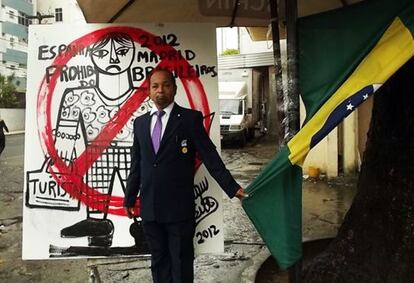The Brazilian painting a sorry picture of Spain’s border controls
Deported artist goes on hunger strike to protest treatment at Barajas


If they could have foreseen the repercussions the incident would end up creating, the Spanish authorities at Madrid’s Barajas airport would surely not have detained, and 30 hours later, deported the Brazilian artist Menelaw Sete.
Sete, a painter of international repute, was on his way to Milan to participate in an exhibition when he was arrested on Thursday of last week. He was deported on Saturday.
“I have been traveling to Spain for 15 years with the same documentation,” he says. “I had a letter of invitation and everything was in order. I wasn’t even able to speak to the Brazilian Consulate. It was all complete theater. In the holding cells there were only blacks, Mexicans and Brazilians.”
While he was being held at the pleasure of the Spanish authorities, Sete took the opportunity to make 40 paintings of the conditions detainees live in. On his arrival back in Brazil, he staged a protest outside the Spanish Consulate in Salvador de Bahía. He was received by the consul, Jacobo González-Arnao Campos, whom he asked to meet with the media and issue a public retraction of what had occurred.
I feel obliged to enter into this cause because Brazilians are being treated in a humiliating way in Spain"
Sete has since gone on hunger strike and is asking citizens to sign a huge white flag that he intends to deliver to Brazilian President Dilma Rousseff in protest against the situation many Brazilians go through at Spanish airports.
“I feel obliged to enter into this cause because Brazilians are being treated in a humiliating way in Spain. My indignation is not so much personal but over the way they treat people,” Sete told the daily O Globo, adding: “I was held for 30 hours, without being able to shower. The food is terrible. You are only allowed to drink water during meals. And there was only tap water. There were men there, women and children. I even saw a crib. Everybody was in a desperate state.”
The 40 paintings Sete produced during his detention at Barajas will form the basis of an upcoming exhibition. For the artist, gaining entry to Spain at the moment “is a question of luck,” depending on whether a person’s paperwork is considered trustworthy or not.
Repeated complaints over the past four years by Brazilian nationals — including university professors invited to congresses in Europe — about being detained in Madrid and deported back to Brazil led to the Rousseff administration applying the last April a law of reciprocity between the two countries. Since then, the number of Spaniards detained in Brazil and deported back to Spain has risen sharply. The new regulation obliges Spanish visitors to the South American country to show a return ticket, prove they have the economic means to support themselves during their stay and produce a hotel reservation or, in the absence of one, a letter of invitation signed in the presence of a Brazilian notary stating that a Brazilian national will take responsibility for the visitor during their stay — precisely the same requirements demanded of Brazilian visitors to Spain.
Tu suscripción se está usando en otro dispositivo
¿Quieres añadir otro usuario a tu suscripción?
Si continúas leyendo en este dispositivo, no se podrá leer en el otro.
FlechaTu suscripción se está usando en otro dispositivo y solo puedes acceder a EL PAÍS desde un dispositivo a la vez.
Si quieres compartir tu cuenta, cambia tu suscripción a la modalidad Premium, así podrás añadir otro usuario. Cada uno accederá con su propia cuenta de email, lo que os permitirá personalizar vuestra experiencia en EL PAÍS.
¿Tienes una suscripción de empresa? Accede aquí para contratar más cuentas.
En el caso de no saber quién está usando tu cuenta, te recomendamos cambiar tu contraseña aquí.
Si decides continuar compartiendo tu cuenta, este mensaje se mostrará en tu dispositivo y en el de la otra persona que está usando tu cuenta de forma indefinida, afectando a tu experiencia de lectura. Puedes consultar aquí los términos y condiciones de la suscripción digital.








































